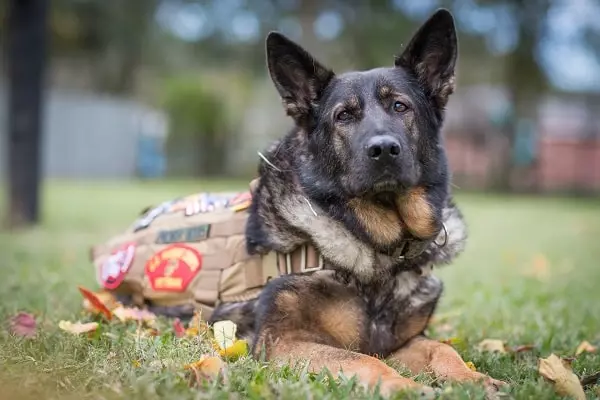The men and women of the United States Armed Forces aren’t the only ones who suffer from post-traumatic stress disorder (PTSD) after returning from active duty — the dogs who serve so bravely alongside them often do as well.
Mission K9 Rescue, a working dog rescue in Houston, TX rehabilitates and re-homes retired military and contract working dogs. Since 2013, they’ve saved over 1,100 dogs and reunited over 540 dogs with former military handlers.
Often, retired military and contact working dogs have been in situations that have caused them severe anxiety and stress. Many retire with issues such as PTSD. These dogs need time with us to decompress and reintegrate into society, and Mission K9 Rescue works with these dogs to make them suitable for adoption.
Rehabilitating Retired Military Working Dogs Who Have PTSD
Causes — Retired working dogs frequently come to Mission K9 from high-intensity and potentially traumatizing circumstances. Many are trained for dangerous and high-risk tasks such as tracking, search and rescue, explosive detection, patrol, and attack, many of them undergoing explosions, air drops, and heavy-handedness by uncaring handlers. Because of this, many of these dogs exhibit PTSD. Of the dogs brought to Mission K9 Rescue, approximately 30% of military working dogs and 50% of contract working dogs exhibit PTSD. Contract working dogs are a higher percentage, as on top of the training and stressful scenarios, they are more likely to be handled poorly and often aggressively.
Removal From Kennels — After retirement, many military working dogs are stuck in kennels, whether overseas or stateside. The first step for rehabilitation of these dogs is to get them out of these kennels as soon as possible, one of the many reasons being that the kennel environment does not help their PTSD.
Symptoms — Dogs with PTSD may exhibit symptoms such as shaking, crying, and trying to hide. They can also be aggressive around people, including being resource aggressive. They may also not trust, occasionally mistrusting one sex over the other due to handler neglect or abuse. Various triggers from their service cause these behaviors.
Treatment — Once Mission K9 Rescue determines a dog to have PTSD, they isolate them in their own play yard so they can get used to their new surroundings and begin to feel a bit more grounded and peaceful. Mission K9 Rescue will also make sure they’re not around any loud noises, which can trigger their condition. “We treat them all the same, giving equal amounts of love and care,” says co-founder, Bob Bryant. “If they cower or show aggression, we’ll take more time with them, working to gain their trust and love. Unfortunately, if dogs with PTSD have continued difficulties, we may have them prescribed Prozac or Trazodone, though we try to keep this at a minimum as there can be nasty side effects.” However, though Mission K9 Rescue can mitigate PTSD with time, love, and patience, “We unfortunately cannot cure it,” says Bob.
Adoption — Despite not being able to fully cure PTSD, Mission K9 Rescue has seen many dogs initially exhibiting PTSD eventually decompress, become adoptable, and find happy homes with devoted caretakers. Behavioral changes that show less agitation, return of normal drive, and sociability are some of the signs we look for when evaluating a dog for adoption that initially presented with PTSD.
Awareness is the key for dogs with PTSD. It takes someone with patience, awareness, and compassion to take care of a dog that has any level of trauma. But as that dog begins to find peace in its new home and develops a sense of trust for its new owner, the richness of the bond can be incredibly special.


